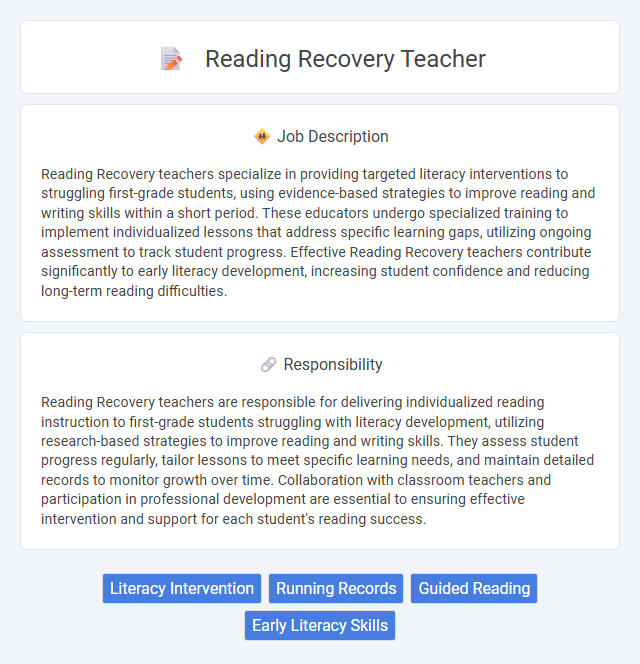
Reading Recovery teachers specialize in providing targeted literacy interventions to struggling first-grade students, using evidence-based strategies to improve reading and writing skills within a short period. These educators undergo specialized training to implement individualized lessons that address specific learning gaps, utilizing ongoing assessment to track student progress. Effective Reading Recovery teachers contribute significantly to early literacy development, increasing student confidence and reducing long-term reading difficulties.
Reading Recovery teacher roles might suit individuals with strong patience and a passion for early literacy intervention, especially those comfortable working closely with struggling young readers. Candidates who enjoy one-on-one teaching and are willing to undergo specialized training could find this job rewarding. However, those seeking a high-paced or less specialized teaching environment may find the role less compatible with their preferences.
Qualification
A Reading Recovery teacher must possess specialized training and certification in early literacy intervention, typically requiring a bachelor's degree in education or a related field along with completion of a Reading Recovery training program. Proficiency in assessing and addressing reading difficulties in first-grade students is essential. Strong skills in individualized instruction, assessment techniques, and progress monitoring are critical qualifications for success in this role.
Responsibility
Reading Recovery teachers are responsible for delivering individualized reading instruction to first-grade students struggling with literacy development, utilizing research-based strategies to improve reading and writing skills. They assess student progress regularly, tailor lessons to meet specific learning needs, and maintain detailed records to monitor growth over time. Collaboration with classroom teachers and participation in professional development are essential to ensuring effective intervention and support for each student's reading success.
Benefit
Reading Recovery teachers probably experience significant benefits including the opportunity to make a direct, positive impact on struggling young readers' lives. The role likely offers professional development and specialized training that enhances instructional skills and career growth. Financially, the position may provide competitive pay coupled with the fulfillment of contributing to early literacy success.
Challenge
Reading Recovery teacher jobs likely involve significant challenges due to the need for specialized training and the responsibility of providing intensive, individualized instruction to struggling first-grade readers. The role probably requires patience and adaptability to address diverse learning needs and to continually assess student progress. This position may demand strong problem-solving skills to tailor interventions effectively and to overcome potential setbacks in student improvement.
Career Advancement
Reading Recovery teacher roles offer opportunities for career advancement through specialized training and certification, enhancing expertise in early literacy intervention. Experienced Reading Recovery teachers can progress to positions such as literacy coach, specialist, or program coordinator, influencing broader educational strategies. Continuous professional development in evidence-based reading instruction also opens pathways to leadership roles within schools and districts.
Key Terms
Literacy Intervention
Reading Recovery teachers specialize in one-on-one literacy intervention for struggling first graders, utilizing targeted strategies to improve reading and writing skills quickly. These educators assess individual student needs and implement research-based lessons designed to close literacy gaps within a short timeframe. Their role is critical in fostering early literacy development, reducing long-term reading difficulties, and enhancing student academic success.
Running Records
Reading Recovery teachers utilize Running Records as a critical assessment tool to monitor students' reading behaviors and developmental progress. These real-time records capture errors, self-corrections, and comprehension, providing detailed insights to tailor individualized instruction. Mastery in interpreting Running Records enables teachers to design targeted interventions that accelerate literacy growth in struggling young readers.
Guided Reading
Reading Recovery teachers specialize in guided reading strategies that support struggling readers in early grades, improving literacy skills through personalized instruction. They implement targeted lessons designed to accelerate reading progress by focusing on phonemic awareness, vocabulary development, and comprehension techniques. Effective guided reading sessions led by these teachers contribute to increased student confidence and measurable gains in reading proficiency.
Early Literacy Skills
Reading Recovery teachers specialize in early literacy skills, providing targeted instruction to struggling first graders to improve reading and writing proficiency. They use assessment-based strategies to individualize lessons that develop phonemic awareness, vocabulary, and comprehension abilities. Their role is crucial in accelerating literacy growth, ensuring students meet grade-level benchmarks and gain confidence in foundational reading skills.
 kuljobs.com
kuljobs.com